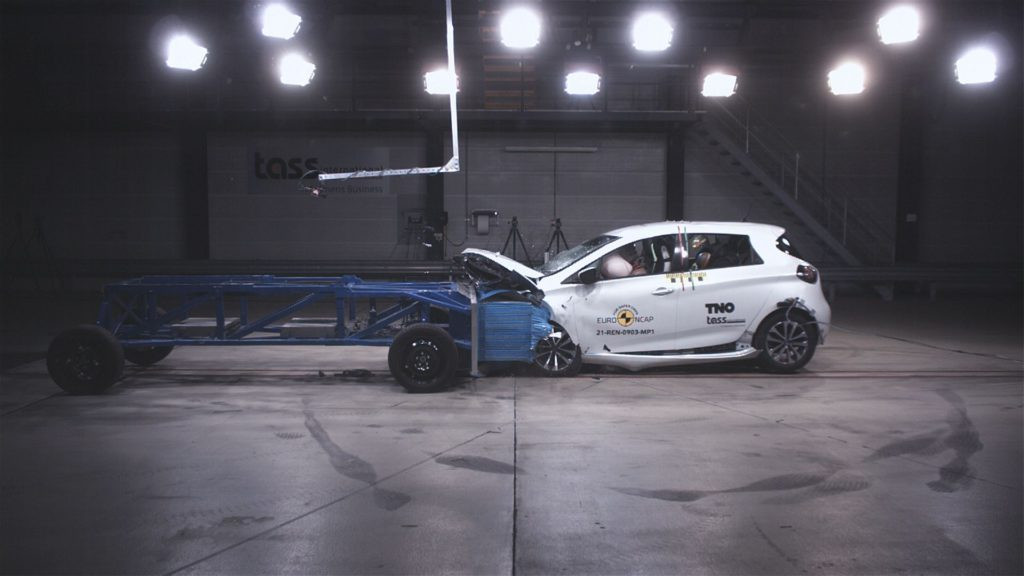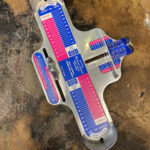The Renault Zoe, once a pioneer in the electric vehicle (EV) market, has received a shocking zero-star safety rating from Euro NCAP, marking a significant blow to its reputation and raising concerns about safety standards in budget EVs. This dismal score places the Zoe among a very small group of vehicles that have ever achieved such a low rating, highlighting a concerning step back in safety for a car that was once considered a leader in its class.
 Renault Zoe zero-star Euro NCAP crash test
Renault Zoe zero-star Euro NCAP crash test
This rating is especially alarming considering the Renault Zoe was initially awarded a five-star rating in 2013 under older, less stringent Euro NCAP protocols. However, recent tests under the updated and more demanding 2020 protocol revealed critical safety deficiencies. Alongside the Zoe’s zero-star result, Renault Group’s budget brand Dacia also fared poorly, with the Dacia Spring EV achieving only a one-star rating. This double setback for Renault Group raises serious questions about its commitment to safety in its electric vehicle lineup, particularly as other manufacturers continue to achieve top five-star ratings for their latest models.
Understanding the Zero-Star Rating: Safety Feature Downgrades and Crash Test Failures
The Renault Zoe’s zero-star rating is not simply a matter of stricter testing; it reflects actual downgrades in safety features in recent model updates. Euro NCAP testing revealed that Renault made a significant change in 2017, removing seat-mounted head and thorax side-protection airbags and replacing them with less effective thorax-only units. This decision had a direct and negative impact on occupant safety, as demonstrated in the crash tests.
In the crucial frontal offset crash test, the Zoe’s performance was categorized as ‘poor’, primarily due to inadequate protection for the driver’s chest. However, the most concerning results emerged from the side-pole impact test. In this severe test, designed to simulate a car colliding sideways with a tree or pole, the driver’s head made direct contact with the intruding pole. Analysis by Thatcham Research, a Euro NCAP partner, indicated a high risk of serious injury and even life-threatening conditions for occupants in such an accident scenario.
 Renault Zoe zero-star Euro NCAP crash test
Renault Zoe zero-star Euro NCAP crash test
The removal of essential safety equipment, combined with inherent structural weaknesses exposed in the crash tests, contributed to the unprecedented zero-star rating. This outcome underscores the critical importance of continuous safety improvements and adherence to modern safety standards, especially as vehicle technology and crash test protocols evolve.
The Absence of Modern Safety Assist Technologies
Beyond passive safety issues highlighted in crash tests, the Renault Zoe also falls short in active safety technology. Modern vehicles are increasingly equipped with advanced driver-assistance systems (ADAS) designed to prevent accidents in the first place. However, the Zoe lacks fundamental systems that are now commonly standard in many new cars, such as lane departure warnings and autonomous emergency braking (AEB).
This deficiency is reflected in the Zoe’s Safety Assist category score of just 14%, significantly lower than the average of 75% achieved by other automakers in the same year. The absence of these crucial safety assist technologies further contributed to the low overall rating and raises questions about Renault’s strategy regarding safety features in its electric vehicles.
Dacia Spring’s One-Star Rating: Reinforcing Safety Concerns within Renault Group
The poor performance was not limited to the Renault Zoe. The Dacia Spring, another electric vehicle from Renault Group, also received a disappointing one-star rating from Euro NCAP. Euro NCAP’s assessment of the Spring was equally critical, citing “downright problematic” crash test performance with a high risk of life-threatening injuries to the driver’s chest and rear passenger’s head in frontal impacts. Marginal chest protection in side impacts further contributed to the low score.
 Renault Zoe zero-star Euro NCAP crash test
Renault Zoe zero-star Euro NCAP crash test
The combined poor ratings of both the Renault Zoe and Dacia Spring suggest a broader issue within Renault Group’s approach to vehicle safety in its transition to electric mobility. While the company aims to offer affordable electric vehicles, these results indicate that safety may have been compromised in the pursuit of cost-effectiveness.
Renault’s Response: Compliance vs. Optimal Safety
In response to the Euro NCAP results, Renault stated that the Zoe E-Tech Electric is a safe vehicle that complies with all regulatory safety standards. The company emphasized that safety regulations are constantly evolving and becoming more stringent, and Renault continually improves its offerings to meet these regulations. Renault also pointed out that the Zoe initially received a five-star rating in 2013 under the Euro NCAP protocol at that time and that the protocol has undergone five changes since then.
However, critics argue that simply meeting minimum regulatory standards is not sufficient, especially when safety technology has advanced significantly. Matthew Avery from Thatcham Research highlighted the irony of Renault, a company that pioneered combined head and thorax airbags, now removing head protection from this vital safety feature. This decision, according to Avery, severely impacts occupant safety and represents a step backward for a brand once synonymous with safety innovation.
Michiel van Ratingen, president of Euro NCAP, echoed these concerns, stating that the disappointing results for the Zoe and Spring suggest that “safety has now become collateral damage in the group’s transition to electric cars.” He criticized the lack of appreciable active safety systems and the subpar occupant protection, questioning the ethics of offering affordable green cars at the expense of increased injury risk in accidents.
Conclusion: Prioritizing Safety in the Electric Vehicle Revolution
The Renault Zoe’s zero-star Euro NCAP rating serves as a critical reminder that safety must remain paramount, even as the automotive industry rapidly transitions to electric vehicles. While affordability and environmental concerns are important drivers in the EV market, they should not come at the cost of compromising safety.
For consumers, the Euro NCAP results provide crucial information for making informed purchasing decisions. For manufacturers, it is a wake-up call to prioritize safety engineering and actively strive to exceed minimum regulatory requirements. As electric vehicles become increasingly mainstream, ensuring robust safety standards is essential for building consumer trust and realizing the full potential of electric mobility. The Renault Zoe’s case underscores that past achievements are no guarantee of present safety, and continuous improvement and a commitment to comprehensive safety are non-negotiable in the modern automotive landscape.

